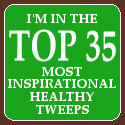I am so happy to have my friends at Vtrim back with another great guest blog post on handling those times when the 'hungries' seem overwhelming and also - how to handle the monotenany of a vegetarian diet & protein needs... they provide valuable info and great knowledge, so please welcome them back! :)
Hi HLG Blog Readers!
It’s Beth and Heather, Registered Dietitians from Vtrim Online, and we’re here with answers to your insightful questions from HLG’s birthday blog post. Thanks HLG!
We were excited to see so many great questions that indicated you do not take your health for granted. At Vtrim, we also value credible, scientific information – no gimmicks! So with that in mind, we narrowed your questions down and merged a few into one response to get more of your questions answered.
Kyra asked, “What do you do when "I want to eat everything in the fridge" strikes. I've been running for my workouts, and sometimes I just get the HUNGRIES!
 By paying attention to your hunger cues, you will determine which eating patterns work best for you to establish your personal healthier routines that avoid large peaks and valleys in your energy and hunger levels.
By paying attention to your hunger cues, you will determine which eating patterns work best for you to establish your personal healthier routines that avoid large peaks and valleys in your energy and hunger levels. Additionally, keep in mind that it is natural to need to refuel your body every 3-4 hours to keep your hunger cues at bay. Lean/lowfat protein is the #1 way to fuel up AND manage your appetite. When you do eat, be sure to include healthy, high protein foods.
OMGifatty said “I am getting the vegetarian blues! I am bored with my food choices, and don't really want to load up on the tofu and processed fake meats... I guess my question is, as a vegetarian, what should I be shooting for in terms of protein intake per day, if I am aiming for 12-1600 calories a day, 20-30 fat grams? Is there anything I should be looking out for, as I begin to fiddle with my diet?”
And Risse asked “I get bored of eating the same foods - what are some creative/different ways to get protein?
Chances are that when you feel like you’re stuck in a rut, your eating choices could use a little shaking up. Sure there are some great healthy sources of protein out there, but eating the same things day in and day out can get boring. Having some variety is helpful. It’s interesting that research shows that the greater variety of healthy foods you eat in your diet, the more likely you will maintain your healthy habits. But on the flip side, the greater variety of foods in your diet that are high in sugar and fat (those simple carbs and the sweet and savory calorie traps) the less likely you will be to maintain a healthy weight. So variety in your diet with the RIGHT types of foods is important. For those who are looking to get more protein, lean meats/poultry, eggs, and low-fat or non-fat dairy products (milk, yogurt, string cheese or other lower fat cheeses) are quick ways to get it in. But if you’re vegetarian, your choices are more limited.
Whether vegetarian or not, one of the best sources of protein in your diet is the dried bean/legume family (think pinto, black, chili, garbanzo, white, lowfat refried, etc). Not only are they packed with protein, they’re loaded with fiber, too. So they are great appetite managers. Just a ½ cup serving can go a long way. Nuts are also a great source of protein. They are high in fat (heart healthy fats) though so their calories add up, making portion control key. Nut butters are another way to creatively get more protein in. And higher protein cereals like kashi or higher protein grains like quinoa can add some variety to your protein intake.
So how much protein do you need? Typical recommendations are that 15-25% of your total calorie intake should come from protein. That’s 45-75 g protein for a 1200 calorie diet and 60-100 g protein for a 1600 calorie diet. The basic recommendation based on body size is .8 g/kg body weight (kg=pounds divided by 2.2). So for a 200-pound individual, that’s just under 75 g protein/day.












0 comments:
Post a Comment